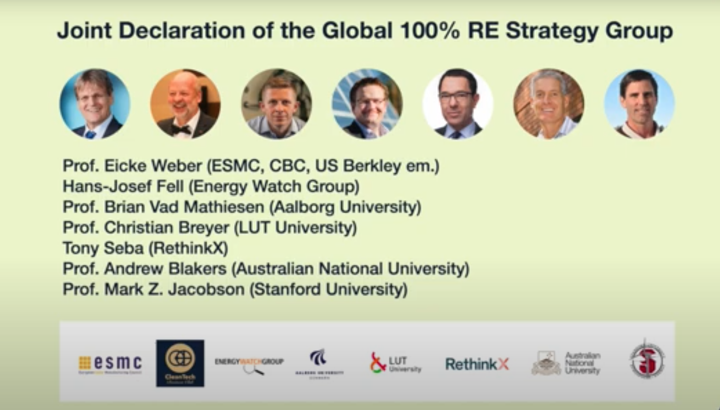(ATF) A group of leading energy experts are campaigning for a rapid global energy transformation, saying the world must shift to nearly 100% use of renewable power sources within the next 10 to 15 years – “much sooner than 2050” – for the planet to avoid extensive ecological damage.
The 100% Renewable Energy (RE) Global Strategy Group, as they are called, released a 10-point declaration at a conference in Dubai this week.
Leaders of the group said that solar, wind and battery systems are already the cheapest and least environmentally damaging sources of power – and they are projected to become far cheaper in the years ahead.
They said “super-abundant” power would be available to all countries and all sectors of society and that switching to solar and wind power, primarily, would create millions of jobs and save trillions of dollars in social and health costs from polluting emissions and maintaining coal-fired, nuclear and oil-fuelled systems that are creating an environmental catastrophe.
Their key message is: “The transformation to 100% renewables is possible and will be coming much faster than the general expectation. A 100% renewable electricity supply is possible by 2030, and with substantial political will around the world, 100% renewable energy is also technically and economically feasible across all other sectors by 2035.”
The 100% RE Global Strategy Group – made up of experts on solar power, renewables and “smart” power grids – say this change is already happening. Close to a dozen countries have already achieved this switch and another dozen have passed laws to reach 100% renewable electricity by 2030. Plus, a further 49 countries have passed laws to reach 100% renewable electricity by 2050, they say, along with 14 states in the US and 300 cities around the world.
But this transformation needs to happen more quickly, they say.
Prof Mark Jacobson from Stanford University said: “We have lost too much time in our efforts to address global warming and the seven million air pollution deaths that occur each year, by not focusing enough on useful solutions.
“Fortunately, low-cost 100% clean, renewable energy solutions do exist to solve these problems, as found by over a dozen independent research groups. The solutions will not only save consumers money, but also create jobs and provide energy and more international security, while substantially reducing air pollution and climate damage from energy. Policymakers around the world are strongly urged to ensure we implement these solutions over the next 10-15 years.”
Another member of the group, Tony Seba, a lecturer at Stanford and well-known author, who founded RethinkX in the US, said his research had shown a decade ago that car manufacturers would shift to electric vehicles in 2020-21, as is currently happening.
“This group of researchers has developed dozens of science-based studies over several decades, using different methodologies, and covering hundreds of regions around the world. The conclusion is clear: a global energy system powered by 100% clean renewable energy is not just possible over the next 10-15 years, it can also save money, create jobs and wealth, save lives, and get humanity ahead of the curve to prevent runaway climate change,” Seba said.
“It is economically, socially, geopolitically and environmentally irrational for us to kick the can down the road to 2050.”

The five other members of the 100% RE Global Strategy Group are Prof Eicke Weber (Berkeley University, Freiburg, Germany), Prof Andrew Blakers (Australian National University, Canberra), Prof Christian Breyer (LUT University, Finland), Hans-Josef Fell (Energy Watch Group, Germany), and Prof Brian Vad Mathiesen (Aalborg University, Denmark).
Prof Eicke Weber said: “Bringing together this unique group of globally leading scientists allowed us to determine the key common elements resulting from all our studies on a world that is reliably supplied by 100% renewable energy in the near future, soon enough to avoid the most catastrophic effects of the looming climate catastrophe.”
Brian Vad Mathiesen commented: “With low-cost renewable energy-based electricity in place in 2030 a parallel rapid transition and re-design of the national energy systems will be feasible, using a ‘smart’ energy system approach combining electricity with energy efficient buildings, district heating, electrified transport and industry, as well as energy storage. We provide a deep understanding of the technical solution; decision-makers now need to re-design the energy markets for the re-designed energy systems.”
The Strategy Group’s declaration and key findings of their research from the past two decades were summarized and presented at a conference of the 2021 Partner Meeting of the Desert Energy Initiative Dii in Dubai. Their declaration and other material can be found at www.Global100REStrategyGroup.org.
Their statement said: “The Earth’s climate emergency requires the completion of a zero-emissions economy much sooner than the generally discussed target year of 2050. A target year needed for ending our CO2 and other climate-warming and air pollutant emissions is proposed to be 2030 for the electric power sector and soon thereafter, but ideally no later than 2035, for other sectors.
“The central question of [our] studies was whether and how it is possible to achieve the goal of 100% supply of the world’s energy demand with renewable energies already by 2030 for the electricity demand, and 2035 for the total energy demand. The core solution to meeting this timeline is to electrify or provide direct heat for all energy and provide the electricity and heat globally with 100% clean renewable energy.”
In addition to the seven initial signatories, dozens of invited academics and other researchers in the renewables field have supported their statement.
“Over 300 cities worldwide have passed laws to reach 100% renewable electricity by no later than 2050; and over 280 international businesses have committed to 100% renewables across their global operations. However, only Denmark has passed laws to reach 100% renewable energy across all sectors, and it is by 2050,” the group said.
“In the public debate, policies to reach 100% renewables across all energy sectors are few in number, and by 2035 are non-existent. Some have considered such policies impractical. Based on old data, even major bodies, such as IRENA and the Intergovernmental Panel on Climate Change (IPCC), have only demanded to achieve 70% RE by 2050. The EU as a whole has only a 32% RE target in total energy by 2030, Germany has only a 65% target in the electric power sector.”
ALSO SEE:
- China’s climate neutral pledge – pipe dream or reality?
- New coal projects in China make up 90% of global total
- New Delhi’s coal ambitions send mixed climate change message
- Investors launch climate plan to get to zero emissions by 2050
- Asian insurers see green future by phasing out fossil fuel investment























